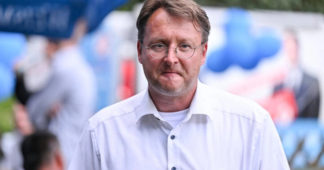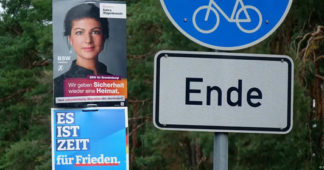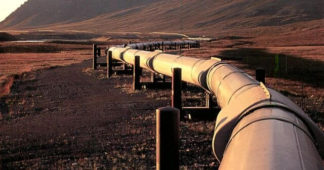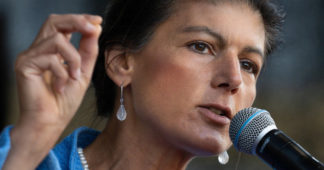Anti-establishment politicians in the eastern half of the country performed strongly in state-level elections as members of the German chancellor’s so-called “traffic light coalition” came up short.
Parties critical of Olaf Scholz’s support for the Western-backed Ukraine proxy war against Russia fared well in elections in eastern German states Sunday, causing the German chancellor to lament the “bitter” results.
“The election results of Sunday are bitter – also for us,” said Scholz. “All democratic parties are now called upon to form stable governments without right-wing extremists… Our country cannot and must not become accustomed to this.”
The strong performance of the right-wing Alternative für Deutschland party made headlines this weekend. The party received an unprecedented share of the vote thanks in part to substantial support from 18 to 29 year olds, surging to a close second place to the conservative Christian Democratic Union (CDU) party in Saxony with 30.6% of the vote.
The AfD won its first German regional election in the state of Thuringia by almost 10 points, finishing with 32.8% of the vote.
Other opposition parties also performed well. The upstart left-wing Sahra Wagenknecht Alliance (BSW) received 11.8% of the vote in Saxony and 15.8% in Thuringia. The democratic socialist Die Linke, which traces its lineage to the former East German Socialist Unity Party (SED), received 13.1% in Thuringia.
The AfD, BSW, and Die Linke were relatively united in their expression of opposition to Scholz’s support for Ukraine’s war against Russia. Alternative für Deutschland and the Sahra Wagenknecht Alliance both called for an end to arms shipments to the Kiev regime and immediate negotiations to bring about a peaceful end to the conflict. The BSW has also demanded a popular referendum on plans to station US missiles in Germany as a condition for any coalition government.
Die Linke has been more internally divided on the issue, but influential politicians within the party have also strongly criticized Scholz’s pro-war stance.
“Russia will not be forced to its knees by weapon supplies,” said Die Linke co-chair Dietmar Bartsch in 2023. “Who says that the people of Ukraine want more weapons? Most Ukrainians want only for the war to end so that they could live in peace.”
AfD has also strongly criticized the German chancellor for his response to the apparent sabotage of the Russo-German Nord Stream gas pipeline in 2022, which is widely perceived to have been carried out by or on behalf of the United States.
“Critical infrastructure on which the competitiveness of German industry depends was blown away before our eyes,” said AfD Minister of European Parliament Maximilian Krah on the issue.
“I still have enough contacts in the US that my American friends can tell me: ‘Of course it was the United States [who destroyed the pipeline], who else?” he continued.
“There is no reason to assume that the German government is seriously interested in unearthing the truth about who is behind the Nord Stream attacks,” said AfD politician Dr. Gunnar Beck recently. “The German government regularly yields to international pressure from both the EU and the US. It will not be able and not be willing, more importantly, to assert the national interests.”
Alternative für Deutschland has drawn significant scrutiny in Europe for its alleged sympathies towards the former German Nazi party. Krah was heavily criticized in May for comments that appeared to defend some members of the Nazi Schutzstaffel (SS) paramilitary organization. Earlier this year, the co-leader of the AfD in Thuringia Bjorn Hocke was fined for using a banned Nazi slogan during a speech at a campaign rally.
AfD has nonetheless enjoyed increasing support for its criticism of the German political establishment, particularly regarding the Ukraine proxy war and immigration policy.
The AfD is particularly strong in eastern German states, which maintain a political character distinct from that of the western half of the country. Many East Germans remain unsatisfied with many of the changes that have taken place since the former socialist German Democratic Republic (GDR) was annexed by the NATO-aligned West German state in 1990.
Polling has revealed that a majority of eastern Germans feel life was better under the former Soviet-aligned GDR. Many people living in the eastern half of the country also maintain a positive perception of Russia and oppose Germany’s backing of the Kiev regime.
Also read
German elections: Far right wins big — results in numbers
Sahra Wagenknecht drives German far-left party’s win
The German mainstream is collapsing
Mathew D. Rose – German State elections: a Tectonic Political Shift
Confronting the far right in Germany, Britain and France
Sahra Wagenknecht:Condition of Germany
We remind our readers that publication of articles on our site does not mean that we agree with what is written. Our policy is to publish anything which we consider of interest, so as to assist our readers in forming their opinions. Sometimes we even publish articles with which we totally disagree, since we believe it is important for our readers to be informed on as wide a spectrum of views as possible.











